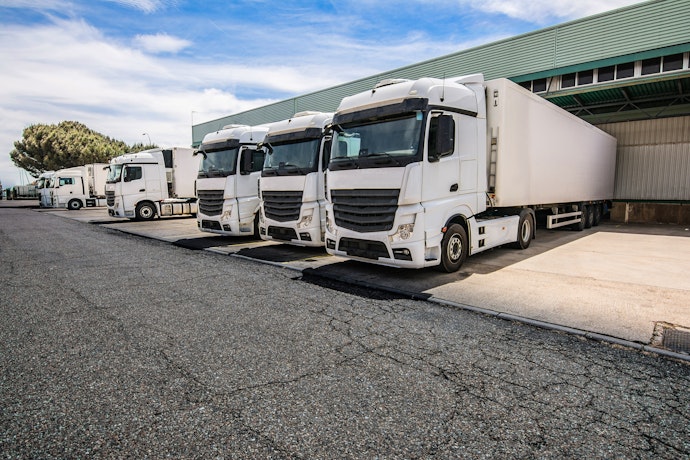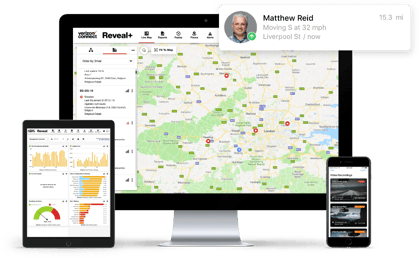9 Secrets to Reducing your Fleet Expenses
As a fleet owner, your day-to-day costs can quickly add up. What you don’t know is there are further hidden, expensive...
Read more
After the 2004 Athens Olympics, Team GB’s cycling team had won just three gold medals in almost 80 years. In the three Olympic Games that followed, they took home 20.
How? The answer is marginal gains. In 2003, Team GB adopted a new policy to focus on incremental improvements across multiple metrics. The thinking went that achieving these micro objectives would soon add up to more significant improvements across the team – and clearly, it worked.
It’s an approach that can also be successfully applied to large fleets. Reducing idling by a minute here or speed by a mile per hour there can potentially add up to increased efficiency and lower costs.
But to make these improvements, you first need total visibility of your operation. Otherwise, hidden inefficiencies may be standing in the way of your progress. That’s where GPS fleet tracking technology comes in.
Once in place, a GPS solution can monitor key metrics across your fleet, highlighting areas needing improvement and giving you deep insight to make faster, more informed business decisions. Here are just a few of the ways it can help.
68% of businesses with a GPS tracking solution stated that it is “very” or “extremely” beneficial.
Idling may seem inconsequential, but if left unchecked, it can be a serious drain on fuel economy.
Consider five drivers making ten stops per day, leaving the engine running for just a minute at each. That’s 50 minutes idling per day across your fleet – or five hours across a standard working week.
Wasting fuel in this way means higher fuel costs in the long run, not to mention additional wear and tear on engine parts. With a fleet management solution, you can monitor instances of idling across your fleet to spot poor performers and coach more fuel-friendly behaviours.
56% of fleets have lowered fuel costs since implementing GPS fleet tracking.
Idling is not the only way your drivers may inadvertently increase your fuel bills. Harsh driving events like speeding and rapid acceleration can also increase fuel consumption.
With GPS fleet tracking, monitoring these behaviours is easy. Data gathered on these events, along with others such as hard braking or harsh cornering, is used to create driver safety scorecards. The safer the driver, the higher the score.
This safety ranking can then be used to reward top performers and incentivise others to improve.
Your vehicles can hamper fuel efficiency just as much as your drivers. Under-inflated tyres, clogged filters, low fluid levels and more can all affect the miles you’ll get to the gallon. And while they may be small, they become increasingly noticeable over time.
Fleet management technology can help you stay on top of maintenance and potentially avoid such inefficiencies. You can set alerts based on engine hours, mileage, or date to be informed whenever part replacement, servicing, or routine repairs are due.
As well as helping to lower your fuel costs, this proactive approach to maintenance can reduce wear and tear on vehicles, lowering the risk of expensive downtime and hefty repair bills.
52% of fleets report improved maintenance processes with GPS tracking.
It goes without saying that the fewer miles your vehicles cover, the less fuel they are likely to use. Thanks to intelligent scheduling algorithms, a comprehensive fleet management solution can efficiently plot each day’s jobs, accounting for job type, road conditions and customer requirements.
As well as helping to reduce mileage and fuel consumption, this approach may also allow busy fleets to fit more jobs into the working day. Live location data also makes it easy to quickly locate and redirect a vehicle to new jobs as they come in.
When you consider the potential impact of marginal gains across multiple metrics, it’s clear why any area of inefficiency cannot be overlooked.
With Verizon Connect’s suite of fleet management applications, you can monitor and manage everything from driver behaviour and road safety to fuel consumption and unauthorised use. So, you can spot and address areas of waste – potentially increasing productivity, efficiency and profitability.
Book a free demo to see the solution in action.
Tags: All




Find out how our platform gives you the visibility you need to get more done.
As a fleet owner, your day-to-day costs can quickly add up. What you don’t know is there are further hidden, expensive...
Read moreVerizon Connect Reveal tracks the fleet data that can have a big impact on your business. These are things like where...
Read moreAt Verizon Connect, we can only provide the highest possible level of service to fleet managers and business owners by...
Read moreReveal tracks the fleet data that can have a big impact on your business. These are things like where your vehicles are...
Read more